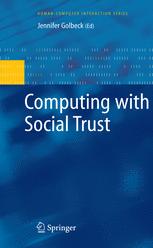

Most ebook files are in PDF format, so you can easily read them using various software such as Foxit Reader or directly on the Google Chrome browser.
Some ebook files are released by publishers in other formats such as .awz, .mobi, .epub, .fb2, etc. You may need to install specific software to read these formats on mobile/PC, such as Calibre.
Please read the tutorial at this link: https://ebookbell.com/faq
We offer FREE conversion to the popular formats you request; however, this may take some time. Therefore, right after payment, please email us, and we will try to provide the service as quickly as possible.
For some exceptional file formats or broken links (if any), please refrain from opening any disputes. Instead, email us first, and we will try to assist within a maximum of 6 hours.
EbookBell Team

4.0
66 reviewsAs open, distributed systems like the Web continue to grow, and more and more content created by users becomes available, the question of whom and what can be trusted becomes increasingly important. This book looks at one solution – social trust relationships – and examines the challenging research problems raised by computing with social trust.
In bringing together important research in computing social trust from both computer science and related disciplines, this book provides an invaluable overview of the area. Divided into three parts, the first – Models of Social Trust – addresses theory, behaviour and trust management, analysing how trust is developed, the dynamics of trust relationships, and systems for trust management. Part Two – Propagation of Trust – describes algorithms and methods for computing trust in social contexts. Social networks, profile similarity, and participation in online communities are all sources from which trust can be computed. The final part – Applications of Trust – contains applications such as recommender systems, website access control, and email filtering, where trust can improve functionality.
With contributions from leading researchers in the area of social trust, this book will be welcomed by researchers and graduate students in computer science and information systems, as well as those working in related disciplines where trust may be an issue (such as communications and psychology).